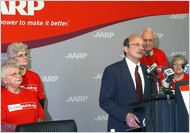|
|
AARP Says It Will Become Major Medicare Insurer While Remaining a Consumer Lobby
By Robert Pear,
New York Times
April 17, 2007

William Novelli, AARP chief executive, with members in March. The goal is a “healthier America,” he says.
The products for people under 65 include a managed care plan, known as a preferred provider organization, and a high-deductible insurance policy that could be used with a health savings account.
When the new coverage becomes available next year, AARP will be the largest provider of private insurance to Medicare recipients. In addition to the new H.M.O., AARP will continue providing prescription drug coverage and policies to supplement Medicare, known as Medigap coverage.
William D. Novelli, the chief executive of AARP, said, “In launching these initiatives, we are driven by our mission to create a healthier America.”
The group also said it would use its leverage to reshape the health insurance market. The organization has 38 million members, and Mr. Novelli said it hoped to have 50 million by 2011.
The new Medicare product will be marketed with UnitedHealth Group. Policies for people under 65 will carry the AARP name and will be marketed with Aetna.
Revenues and royalties from the sale of goods and services have, for many years, accounted for a substantial part of AARP’s income. AARP officials insisted that its financial interests do not affect the positions it takes on Medicare, Medicaid, Social Security and dozens of other issues on which it lobbies and litigates.
Representative Pete Stark, Democrat of California and chairman of the House Ways and Means subcommittee on health, welcomed AARP executives to the Medicare managed care market. “If they provide quality care at a fair price,” Mr. Stark said in an interview, “they could be a wonderful addition.”
But Judith A. Stein, director of the Center for Medicare Advocacy, a nonprofit group that counsels people on Medicare, said, “The new arrangements with insurance companies create a tremendous number of potential conflicts for AARP, which is a powerhouse, perceived as the most important voice for older people.”
The role of private insurers in Medicare is one of the most hotly debated issues in American health policy. In general, Republicans want to expand the role of private insurers like UnitedHealth and Aetna, while Democrats want to limit the role of private entities.
Ms. Stein and her organization work closely with AARP.
“AARP will not be perceived as a truly independent advocate on Medicare if it’s making hefty profits by selling insurance products that provide Medicare coverage,” Ms. Stein said. “AARP’s role in this market could give a big boost to the privatization of Medicare.”
AARP has opposed efforts to privatize Medicare or Social Security.
Dawn M. Sweeney, president of AARP Services Inc., the tax-paying business unit of AARP, said, “We will use our collective market power to negotiate” competitive prices for the new health insurance products.
AARP also said it would use $500 million of insurance sales revenue over the next decade to help people navigate the health care system, with a new counseling service.
Payments to UnitedHealth and Aetna will be linked to their performance in improving the health of subscribers, including members of minorities, Mr. Novelli said. The new plans will coordinate care for people with chronic conditions and will develop special programs to treat people with depression. AARP will measure how frequently the companies deliver recommended treatments to people with diabetes, hip fractures and other conditions.
Insurers typically sign one-year contracts with Medicare. Ms. Sweeney said AARP’s H.M.O. was “guaranteed to be in the Medicare marketplace for two years,” though premiums and co-payments could change after the first year.
People ages 50 to 64 often find that health insurance is unavailable or unaffordable when they try to buy it on their own. AARP said its underwriting practices would be less stringent than those of many commercial insurers, but it reserved the right to deny coverage to some sick people ages 50 to 64.
To guarantee issuance of a policy to every applicant in that age group is “just not economically feasible,” Ms. Sweeney said.
About seven million people currently have health insurance of various types, mainly drug coverage or Medigap policies, carrying the AARP brand name. With the new products, Ms. Sweeney estimated, the number will double to 14 million by 2014.
|
|



